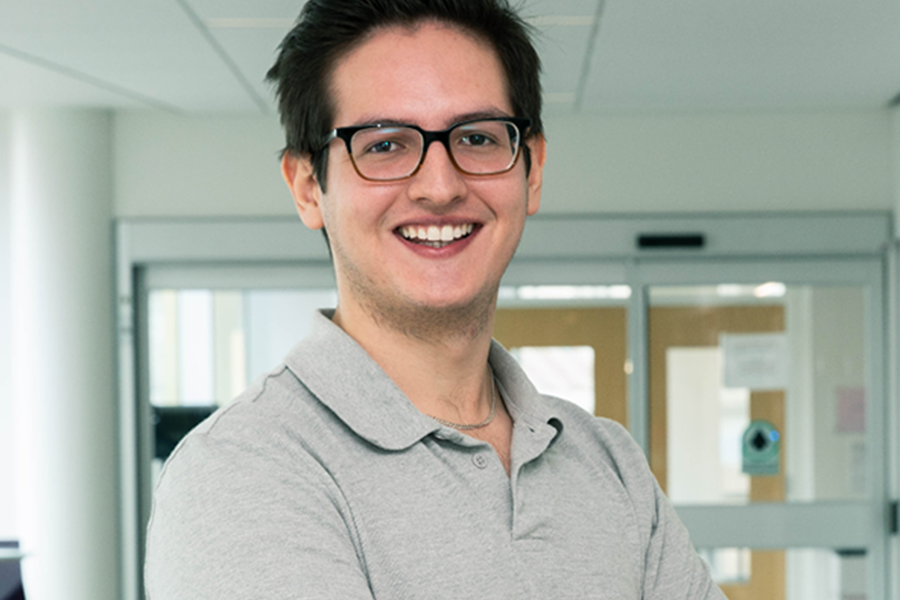CyLab names 2022 Presidential Fellows
S3D's Alejandro Cuevas Villalba named Fellow
By Ryan Noone
Each year, CyLab recognizes high-achieving Ph.D. students pursuing security and/or privacy-related research with a CyLab Presidential Fellowship that covers one year of tuition.
This year’s CyLab Presidential Fellowship recipients are:
Jay Bosamiya
Ph.D. student in the Computer Science Department (CSD)
Advised by Bryan Parno, professor in the Department of Electrical and Computer Engineering (ECE) and the Computer Science Department (CSD)
Bosamiya’s research focuses on the intersection of security, software systems, and programming languages. He works to fundamentally improve the security of practical software systems by developing high-assurance solutions, often with provable safety. Bosamiya has taken on a number of different research directions throughout his Ph.D., working to improve the safety of cryptographic primitives, network protocols, software sandboxing, and more.
“My goal is to explore the difficult problems in security that arise from the complexities of real-world software and try to make a significant practical impact.”
Alejandro Cuevas Villalba
Ph.D. student in Societal Computing at the School of Computer Science
Advised by Nicolas Christin, professor in the Engineering and Public Policy (EPP) Department and the Institute for Software Research (ISR)
Cuevas’s research measures various types of phenomena within dark web marketplaces. While he says not all websites on the Tor network (i.e., hidden services) have ill intent, the anonymity of the Tor network enables the commercialization of drugs and other illegal services. Cuevas’s work looks to find new ways to gather and validate data from these services to help provide law enforcement officials and policymakers with valuable knowledge.
“My goal is to understand the nuanced societal impact these marketplaces have by collecting information, designing experiments to test various hypotheses, and drawing insights.”
Ke Wu
Ph.D. student in CSD
Advised by Elaine Shi, associate professor in CSD and ECE
Wu’s research interests lie in the intersection of cryptography and game theory. With cryptocurrency and blockchains now offering quick and easy payments, as well as innovative financial services, Wu says there are strong incentives to explore the security and fairness of these applications to build safe crypto ecosystems.
“My goal is to lay down a solid theoretical background for the fairness of blockchain, and more broadly decentralized applications, so they can be implemented successfully in the real world.”
Sichao (Jeff) Xu
Ph.D. student in the Theory Group at SCS
Advised by Pravesh Kothari, assistant professor in CSD
Xu’s research is focused on developing new general-purpose techniques to ascertain algorithmic thresholds for foundational average-case computational problems arising in cryptography and machine learning. Much of his work has centered around studying sum-of-squares optimization, a powerful general technique that captures almost every tool applied to a wide class of average-case problems.
“I hope to provide rigorous evidence for algorithmic hardness especially in the average-case setting. My daily research has been mainly theoretical, and receiving this award reassures me of the importance and the potential of our theoretical work in making an impact for real life.”
Shikun (Aerin) Zhang
Ph.D. student in the Language Technologies Institute (LTI) at SCS
Advised by Norman Sadeh, professor of computer science (ISR) and co-director of the Privacy Engineering Program
Zhang explores the many challenges associated with empowering people to effectively exercise their right to be informed and control the collection and use of their data. Her current research aims to improve the design and increase the adoption of privacy nutrition labels, providing users with the tools to manage and understand how their data is being utilized.
“I love working on privacy in an academic setting where we have the freedom to ask important questions and develop creative solutions to help users protect their privacy. Privacy is very challenging and requires a lot more research.”
